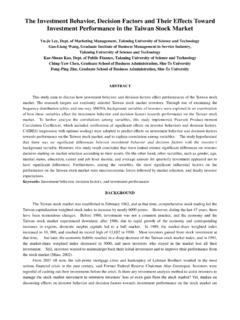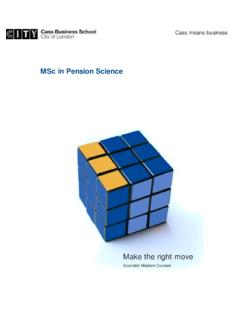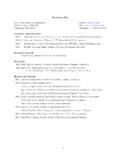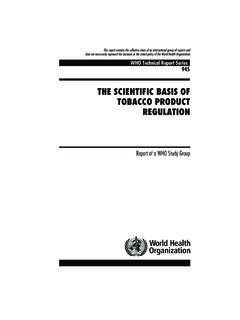Transcription of The Regulation of Cosmetics in Japan
1 The Regulation of Cosmetics in Japan Presented by Dr. Mike Hayashida, YDC Tokyo Obtained doctorate degree in law school of Tokyo University. An ex-lawyer and a member of the government advisory committee for functional food in Japan . Currently, a principal of YDC Tokyo and its associated companies of his own. 1. Overview The Regulation by the Pharmaceutical Affairs Act [Fig. 1] Coverage of pharmaceutical Affairs Act Pharmaceutical Affairs MHLW. Act Medical Drugs Quasi Drugs Cosmetics Devices 1. Overview The Regulation by the Pharmaceutical Affairs Act [Fig. 2] Two types of Cosmetics Cosmetics (General) Medicated Cosmetics Cosmetics 1. Overview The Regulation by the Pharmaceutical Affairs Act [Fig. 3] Composition of Quasi Drug category Quasi Drugs Hair growth products Hair removal products, Medicated etc. Cosmetics 1. Overview The Regulation by the Pharmaceutical Affairs Act [Fig.]
2 4] Regulation history 2001 Abolition of approval system Implementation of self-responsibility system 2005 Implementation of primary distribution system Introduction of GQP and GVP. Cosmetics and Medicated Cosmetics [Fig. 5] Definition of Cosmetics Any item having mild effects on the human body that is rubbed, spread, or otherwise applied in a similar manner for the purpose of cleansing, beautifying, or enhancing the attractiveness of the human body, to change physical appearance, or to maintain skin or hair in a healthy condition. 2. Cosmetics What is Cosmetics ? [Fig. 6] Key 3 roles of cosmetic company Primary Responsible for Distributor Marketing Manufacturer Seller Governmental Manufacture Sell Approval Primary Distributor . Manufacturer . Seller . 2. Cosmetics What is Cosmetics ? [Fig. 7] Role-playing patterns of cosmetic company Primary Distributor Manufacturer Seller 1 Company A Company A Company A.
3 2 Company A Company A Company B. 3 Company A Company B Company C. 2. Cosmetics What is Cosmetics ? [Fig. 8] General requirements of Primary Distributor and Manufacturer Requirements Primary Distributor Manufacturer Personnel requirements Personnel requirements (applicant and general (applicant and head manager of P) technical). GQP/GVP conformity: Physical requirements Execution of operations for (buildings and facilities of quality control and post- manufacturing plant). manufacturing/sales safety management, and appropriate management of manuals and records. 2. Cosmetics What is Cosmetics ? [Fig. 9] Must-dos for GQP/GVP. GQP GVP. Sufficient staff having the Sufficient staff having the capability to appropriately and capability to appropriately and smoothly execute operations smoothly execute operations Duties of general manager of Duties of general manager of manufacturing and sales manufacturing and sales Assignment of quality assurance Assignment of safety officer management officer Duties of quality assurance Duties of safety management officer officer Preparation of procedure Implementation of duties for manuals for quality control safety management Implementation of duties for Record keeping quality control Management of documents and records The requirements for product launch 1) Three types of key person 2) Registration to the government 3) Product name [Fig.]
4 10] Prohibited cases of product naming 1 The same name as that of Drugs or Quasi Drugs 2 A name which leads to misrepresentation 3 A name which suggests Drug-like efficacy 4 A name which includes ingredients name A name which is composed of only by the 5. Roman alphabet ..etc. The requirements for product launch 4) Ingredients [Fig. 11] Types of list for ingredients Preservatives, UV absorbs, Tar colors Positive list Others Negative list The requirements for product launch 4) Ingredients [Fig. 12] A list of 30 prohibited ingredients 1 6-Acetoxy-2,4-dimethyl-m-dioxane 2 Antihistamines except those of aminoether type (such as diphenhydramine). 3 Hormones and those derivatives except estradiol, estrone and ethinylestradiol 4 Vinyl chloride monomer 5 Methylene chloride 6 Bismuth compounds other than bismuth oxychloride 7 Hydrogen peroxide 8 Cadmium compounds 9 Sodium perborate 10 Chloroform 11 Progrenolone acetate 12 Dichlorophene 13 Mercury and its compounds 14 Strontium compounds 15 Sulfamide and its derivatives 16 Selenium compounds 17 Nitrofuran type compounds 18 Hydroquinone monobenzylether 19 Halogenated salicylanilide 20 Vitamin L1 and Vitamin L2.
5 21 Bithionol 22 Pilocalpin 23 Pyrogallol 24 Inorganic fluorine compounds 25 Pregnanediol 26 Local anesthetics such as procaine 27 Hexachlorophen 28 Boric acid 29 Formalin 30 Methyl alcohol The requirements for product launch 4) Ingredients [Fig. 13] Additional Prohibition Additional #1 Medical drug Prohibition ingredients #2 Ingredients that do not meet the standards for Biological Materials The requirements for product launch 4) Ingredients [Fig. 14] DHC, CoQ10's case CoQ10 Not among 30 negative ingredients DHC: Launch cosmetic with CoQ10. MHLW suspended due to medical drug ingredient theory The requirements for product launch 5) Time Required [Fig. 15] Time required for approval The local government accepts the application usually within one week. Marketing Regulation 1) Scope of effectiveness Govt. approval is [ ] Scope of recognized cosmetic effects not required 1 Cleansing hair and scalp 29 Soften skin 2 Using fragrance to reduce unpleasant hair and scalp odors 30 Give gloss to skin 3 Keep hair and scalp healthy 31 Give luster to skin 4 Give moisture and sheen to hair 32 Make skin smooth 5 Moisturize hair and scalp 33 Make beards easier to shave 6 Keep hair and scalp moist 34 Condition skin after shaving 7 Make hair supple 35 Prevent rashes 8 Make hair easier to brush 36 Prevent sunburn 9 Keep hair lustrous 37 Prevent skin splotches and freckles resulting from sunburn 10 Give luster to hair 38 Impart fragrance 11 Stop dandruff and itching 39 Protect nails 12 Control dandruff and itching 40 Keep nails healthy 13 Supplement and maintain hair moisture and oil content 41 Moisten nails 14 Prevent hair breakage and frizzing 42 Prevent chapped lips 15 Improve
6 And maintain hair pattern 43 Fill in lip creases 16 Prevent hair static electricity 44 Moisten lips Cleanse dry skin (that has become dry as a 17 45 Keep lips healthy result of cleansing). Prevent blemishes and rashes (by cleansing). 18 46 Protect lips, prevent dryness (facial wash). 19 Condition skin 47 Prevent lip roughness caused by dryness 20 Combat skin wrinkles 48 Make lips smooth 21 Keep dry skin supple 49 Prevent cavities (brushing teeth with toothpaste). 22 Prevent skin chapping 50 Whiten teeth (brushing teeth with toothpaste). 23 Tighten skin 51 Remove plaque (brushing teeth with toothpaste). 24 Moisten skin 52 Cleanse the mouth (toothpaste). 25 Supplement and preserve skin moisture and oil content 53 Prevent bad breath (toothpaste). 26 Keep skin soft 54 Remove tooth film (brushing teeth with toothpaste). 27 Protect the skin 55 Prevent plaque deposits (brushing teeth with toothpaste).
7 28 Protect skin dryness 56 Making fine wrinkles due to dryness less noticeable Note 1: Parenthesized text refers to aspects of physical form during usage, not to the effect itself. Note 2: #56 should be based on the Guidelines for the Method of Evaluating the Functions of cosmetic Products (2011, Japanese cosmetic Science Society). Marketing Regulation 2) Advertising Regulation [ ] Scope of recognized cosmetic effects MHLW The Act Mainly Efficacy Appropriate advertising standard Other methods for Drugs, Quasi Drugs, Cosmetics besides efficacy and Medical Devices Marketing Regulation 2) Advertising Regulation [Fig. 18] Prohibition in cosmetic advertising 1 Testimonials should not be used besides feeling of use 2 Before-After comparison should not be used 3 Clinical trial data should not be showed Recommendation of medical experts such as a 4. medical doctor is prohibited.
8 Etc. 3. Medicated Cosmetics What is Medicated Cosmetics ? [Fig. 19] Important effectiveness for Medicated Cosmetics Practically important effectiveness as Medicated Cosmetics 1 Skin-whitening or to prevent sun spots and freckles 2 To prevent acne 3 Sterilization by soap 4 Wrinkle improvement The Requirements for product launch 1) Tree types of key person 4) Ingredients [Fig. 20] Approved ingredients for Medical Cosmetics 1 Ascorbic acid/derivatives 2 Placental Extracts 3 Kojic Acid (Obtained by Sansho Seiyaku Co., Ltd. in 1988). 4 Arbutin (Obtained by Shiseido Co., Ltd. in 1989). 5 Ellagic Acid (Obtained by the Lion Corporation in 1996). 6 Chamomilla Extract (Obtained by the Kao Corporation in 1998). 7 4-n-Butylresorcinol (Rucinol ) (Obtained by POLA in 1998). 8 Linoleic Acid (Obtained by Sunstar Inc. in 2001). 9 Tranexamic Acid (Obtained by Shiseido Co.
9 , Ltd. in 2002). 10 4-Methoxy Potassium Salicylate (4 MSK) (Obtained by Shiseido Co., Ltd. in 2003). 11 Adenosine Monophosphate Disodium Salt (Obtained by Otsuka Pharmaceutical Co., Ltd. in 2004). 12 5,5 -Dipropyl-biphenyl-2,2 -diol (Magnolignan ) (Obtained by Kanebo Cosmetics Inc. in 2005). 13 4-(4-Hydroxyphenyl)-2-butanol (4-HPB) (Obtained by Kanebo Cosmetics Inc. in 2007). 14 Tranexamic Acid Cetyl Ester Hydrochloride (Obtained by CHANEL .KK in 2009) ..etc. The Requirements for product launch 5) Scope of effectiveness 6) Time required [Fig. 21] Matrix chart: Active ingredients vs Effectiveness Active Ingredients New B A. Already Effectiveness known New D C. Type A extraordinary difficult Already known Type B very difficult Type C very difficult Type D easy Marketing Regulation 1) Scope of claim [Fig. 22] Scope of claim Drugs Medicated Cosmetics Cosmetics Marketing Regulation 1) Scope of claim [Fig.]
10 23] Scope of claim for acne Drugs cure acne Medicated Cosmetics prevent acne prevent acne by facial wash Cosmetics (soap). 4. Quick look of the regulatory requirements for exporting Cosmetics to Japan [Fig. 24] Business flow of exporting Cosmetics to Japan Primary Distributor in Japan Cooperatio Responsible Monitoring n Foreign Manufacturer Market in Import Manufacturer in Japan Japan Procedure in Japan Storage Labelling








